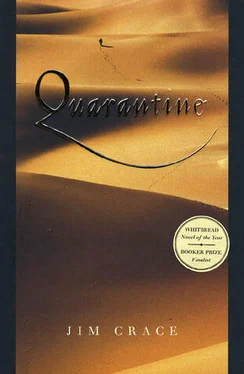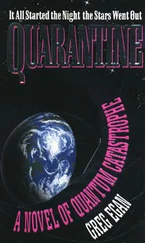Jim Crace - Quarantine
Здесь есть возможность читать онлайн «Jim Crace - Quarantine» весь текст электронной книги совершенно бесплатно (целиком полную версию без сокращений). В некоторых случаях можно слушать аудио, скачать через торрент в формате fb2 и присутствует краткое содержание. Год выпуска: 1998, Издательство: Straus and Giroux, Жанр: Современная проза, на английском языке. Описание произведения, (предисловие) а так же отзывы посетителей доступны на портале библиотеки ЛибКат.
- Название:Quarantine
- Автор:
- Издательство:Straus and Giroux
- Жанр:
- Год:1998
- ISBN:нет данных
- Рейтинг книги:4 / 5. Голосов: 1
-
Избранное:Добавить в избранное
- Отзывы:
-
Ваша оценка:
- 80
- 1
- 2
- 3
- 4
- 5
Quarantine: краткое содержание, описание и аннотация
Предлагаем к чтению аннотацию, описание, краткое содержание или предисловие (зависит от того, что написал сам автор книги «Quarantine»). Если вы не нашли необходимую информацию о книге — напишите в комментариях, мы постараемся отыскать её.
Quarantine
Quarantine — читать онлайн бесплатно полную книгу (весь текст) целиком
Ниже представлен текст книги, разбитый по страницам. Система сохранения места последней прочитанной страницы, позволяет с удобством читать онлайн бесплатно книгу «Quarantine», без необходимости каждый раз заново искать на чём Вы остановились. Поставьте закладку, и сможете в любой момент перейти на страницу, на которой закончили чтение.
Интервал:
Закладка:
Miri watched the four of them until she and her bladder were set free by darkness. She did not see the fifth.
6
The fifth, a male, was far younger than he might have seemed from a distance. Not much more than an adolescent, then. Bare feet make old men of us all, on stony paths at least. But even when he reached the softer and more accommodating track above the landfall, he walked not from the shoulders like a seasoned traveHer intent on vanquishing the rocks and rises in his path, but cat-like from the hips, his toes extended, pointing forwards, and put down with caution before his heels were committed to the ground. He’d learnt the single lesson of the thorn. His feet were already tom and bruised. So: long legs, long neck, long hands, short leopard steps. And like a leopard he paused frequently, not to rest but to sniff the air as if he could locate — beyond the sulphur rising on the vaHey’s thermals — that a caravan of camels had passed, that there were gazelles feeding in the thorns, that there was someone dying in the wilderness ahead.
He was open-mouthed. He looped his tongue from side to side, circling his lips, tasting the atmosphere for smells. In fact his sense of smell had been so bludgeoned by the heat and by his thirst that he could not detect the sulphur even. He was parched and faint. His lips were cracked. His legs and back — unused to heat and effort such as this — were aching badly. If he paused to sniff so frequently, that was because he could smell nothing. It worried him. He hoped to clear the blockage in his nose, and shift his headache too.
He was a traveller calledJesus, from the cooler, farming valleys in the north, a Galilean, and not one used to deprivations of this kind. He’d spent the night in straw, a shepherd’s paying guest, and had that morning left his bag, his water-skin, his sandals and his stick where he’d slept. His quarantine would be achieved without the comforts and temptations of clothing, food and water. He’d put his trust in god, as young men do. He would encounter god or die, that was the nose and tail ofit. That’s why he’d come. To talk directly to his god. To let his god provide the water and the food. Or let the devil do its work. It would be a test for all three of them.
First he had to find a place where he and god could meet in privacy. He’d say, ifasked, that god had told him where to go, the details of this very route. He had been standing at the window of his father’s workshop and godhad called his name. Every time the mallet hit the wood, his namewas called. Andeverytime the mallet hit the wood he took a further step along the road in his mind’s eye, down from the living sea in Galilee to the salt-dead waters in the south, and then ascending to the desert hils and caves.
There were nine days of mallet hitting wood before he found the courage to argue with his family, tie his bag, and leave. The hills were beckoning, he’d said. But as he walked up into the wilderness — his nostrils blocked, his feet raw, another mallet striking on his skuU relentlessly-he could not find much evidence of god. The Galilee was full of god at that time of the year — new crops, flowers on the apricot, the lambs, the warmer nights … It was not hard to worship god in the Galilee. But here the spring had hardly made its mark. Jesus was an optimist. Look at the uncompleted land, he told himself, dry-tongued, enfeebled by the labours of the walk: the vaHeys waiting for their rivers, the browns and yellows waiting for their greens. Creation was unfinished here. This was where the world was not complete. What better place to find his god at work?
Unlike the four who had preceded him that afternoon and set up home amongst the poppies, Jesus did not follow any of the carvings in the rocks which indicated where hermits would easily find caves. He did not mean to leave his imprint softly in the clay. He was looking for much harder ground. He preferred the pious habitats of lunatics and bats where he could live for forty days, hanging by his toes if need be, and not have any excuse for shifting his eyes from heaven for an instant. He’d seen that there were caves set in the crumbling precipice which fell away abruptly below the camel trail, beyond the ambition even of goats. He’d choose one which was hard to reach and inhospitable, exposed to the sun and wind and cold. He set his sights on the remotest and the highest of the caves, a key-shaped hole. It had no more than a sloping rock as its yard, hardly bigger than a prayer-mat, the perfect perch for eagles. And for angels. But Jesus hesitated at the point where he should start to climb down. He surely had the right to drink before he embarked on his trials. It was not dusk. There was, as yet, no thin and bending moon to mark the onset of his fast. God would not come before day one. So he could drink. It was not a sin to drink. It would not be a sign ofweakness, either, if he prepared for quarantine with, say, a simple meal, a wash, a rest.
He’d seen the batwing outline ofMiri’s goatskin tent, pitched on the flatland of the valley head. He walked towards it. There was no one to be seen in the open. But there were goats. Ifthere were goats then there was water too. And milk and meat.
A tethered donkey announced his arrival while he was stiil fifty paces away. Jesus stood, as was the custom, a little distance from the open awning of the tent and waited for the greetings from within, and the invitation to come forward. He could not pay for food and drink. What little money that he had he’d left behind that morning in the keeping of the shepherd. But there are traditions, even in the wilderness. A traveller can wet his face and lips for free.
He coughed. He clapped his hands. He called out greetings of his own. But no one came. That was strange — the tent was unattended, and yet the awnings were still raised. Jesus took a step or two towards the tent, so that he could see inside more clearly. There were the usual signs of domesticity; the rugs and mats, the pots, some bread and dates discarded from a meal and being finished off by ants, the sacks of grain, the remnants of a fire, the skins of water hanging in the shade, the bundled blankets on a bed, the row of shoes. But no one there, as far as he could teH. Jesus looked around for signs of someone approaching, but there were none. He called again, without reply. His patience was not endless. He was keen, he told himself, to reach the cave before darkness and to begin his fast. He was afraid as well. Mraid that he might lose his nerve the moment that he reached the precipice, and go back home at once.
This was not theft. He took a few more steps towards the awning and lifted the nearest and the smallest of the water-skins off its wooden peg. He stooped and picked up the wasted heels of bread, the dates. He rubbed the ants off on his arm. Not killing them. Not trying to, at least. They dropped into the dust and went about their business, unperturbed. He picked some pieces of straw and the small stones from between his toes and off his heels. He squeezed out what thorns he could find. His feet were bruised and sore. His head had not improved. His body ached. Perhaps it would not matter ifhe went inside, out of the sun, if he sat cross-legged within the tent, those blankets as a seat, and took his final supper in some comfort. Again — with water, bread and dates held in his hands — he took some further steps. He left the sun. His eyes were baffled by the darkness. While he waited to become accustomed to the gloom he heard a whistling throat, as if the bunched-up blankets at his ankles were calling out for drink.
‘Who’s there?’ he said.
Again a whistling throat.
‘Who’s sleeping there?’
Fevers wil aUow a period of short lucidity before their victims die. Musa became conscious for long enough to hear that one word sleeping, and then to register the pains throughout his body. His head was spongy like a mushroom. He could feel each vein and pipe, each gut and artery, each bone and nerve, highlighted by his agony. He was a parched and desert landscape, illuminated by lightning. And in that moment when he heard the word he saw the face as well. AJewish face, young and long and womanly. A Galilean face. A peasant face. A robber’s face, for sure, because the man had helped himself to water and was standing with their water-skin held in his hand. Musa would have struck the man if he’d been well enough. It would have been his duty to make it clear that theft, especially of water, deserved some bruises and a bloody nose. It would have been his pleasure, too. But he couldn’t even clench his fist. He tried to caU out Miri’s name. He hadn’t got the breath to make a sound.
Читать дальшеИнтервал:
Закладка:
Похожие книги на «Quarantine»
Представляем Вашему вниманию похожие книги на «Quarantine» списком для выбора. Мы отобрали схожую по названию и смыслу литературу в надежде предоставить читателям больше вариантов отыскать новые, интересные, ещё непрочитанные произведения.
Обсуждение, отзывы о книге «Quarantine» и просто собственные мнения читателей. Оставьте ваши комментарии, напишите, что Вы думаете о произведении, его смысле или главных героях. Укажите что конкретно понравилось, а что нет, и почему Вы так считаете.












